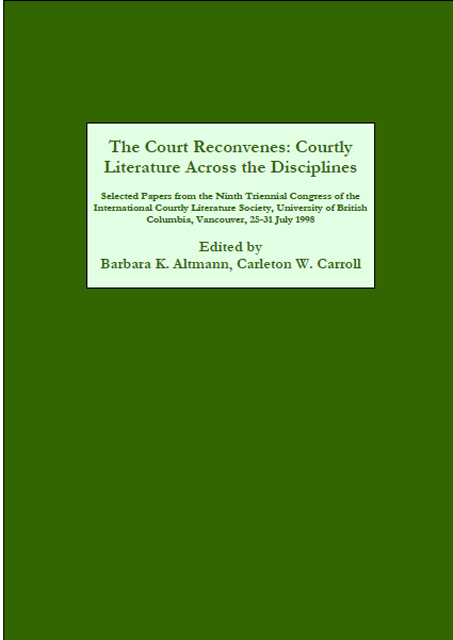 The Court Reconvenes
The Court Reconvenes Lacan, Courtly Love and Anamorphosis
Published online by Cambridge University Press: 31 March 2023
Summary
In several of his texts, Jacques Lacan uses the paradigm of courtly love as a model for desire. In his seventh seminar, L’Ethique de la psychanalyse (given in 1959–60 and published in 1986), he looks at different aspects of courtly love, namely issues related to sublimation (of both subject and object), as well as questions of aesthetics and representation. Lacan examines courtly literature in order to see what it can reveal about the structural dynamics of desire and to explore the ways in which this artificial set of codes and conventions has structured our reality, our emotional make-up, our values and ethics. As he puts it,
l’amour courtois était … un exercice poétique, une façon de jouer avec un certain nombre de thèmes de convention idéalisants, qui ne pouvaient avoir aucun répondant concret réel. Néanmoins, ces idéaux, au premier plan desquels celui de la Dame, se retrouvent dans des époques ultérieures, et jusqu’à la nôtre. Leurs incidences sont tout à fait concrètes dans l’organisation sentimentale de l’homme contemporain, et y perpétuent leur marche. (Séminaire VII 177–78)
Lacan is particularly fascinated by the sudden and artificial appearance of courtly love in a society that seemed an unlikely place to foster these kinds of conventions. He highlights the paradox inherent in the birth of lofty ideals and delicate manners at a time when feudal lords behaved more like brigands than gentlemen (Séminaire VII 151), stating that even the poets themselves could be seen to live in contradiction with the codes they espoused. He cites, with fitting irony, the example of Guillaume de Poitiers, who extolled courtly love but whose behaviour was far from courtly:
Le premier des troubadours est un nommé Guillaume de Poitiers, septième comte de Poitiers, neuvième duc d’Aquitaine, qui paraît avoir été, avant qu’il se consacrât à ses activités poétiques inaugurales dans la poésie courtoise, un fort redoutable bandit, un type de ce que, mon Dieu, tout grand seigneur qui se respectait pouvait être à cette époque. En maintes circonstances historiques que je vous passe, nous le voyons se comporter selon les normes du rançonnage le plus inique. Voilà les services qu’on pouvait attendre de lui. Puis, à partir d’un certain moment, il devient poète de cet amour singulier. (Séminaire VII 177)
- Type
- Chapter
- Information
- The Court ReconvenesCourtly Literature across the Disciplines: Selected Papers from the Ninth Triennial Congress of the International Courtly Literature Society, University of British Columbia, Vancouver, 25-31 July 1998, pp. 107 - 114Publisher: Boydell & BrewerPrint publication year: 2002
- 1
- Cited by
